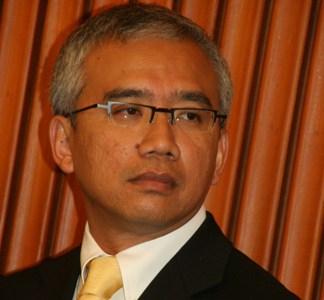Peace process should be reviewed?
The government was urged to rethink about the peace dialogue process with the Barisan Revolusi Nasional separatist group.

Senator Anusart Suwanmongkol of Pattani blamed the surge of violence in recent weeks which claimed the lives of several security personnel and government officials, including Yala deputy governor Issara Thongthawat and the deputy superintendent of Rueso district police, on the Malaysia-brokered peace process deal signed on February 28 in Kuala Lumpur between the government and the BRN.
It was normal that violent incidents to take place almost on daily basis in the deep South, he said, adding, however that, of late, high-ranking officials had fallen victim to insurgent attacks which was unusual.
"I believe this was the result of the highly-publicised peace talk and the rush to conclude the peace deal by someone who had wanted to resolve the southern conflict in a simplistic manner," said Senator Anusart.
The Pattani native recently received a letter from a person, using the pseudonym “Khon Yala”, mocking the peace process as a drama staged by the government with a high price paid for by southern people.
The senator blamed the government for not having carefully thought out a proper plan to deal with a possible surge of violence in the aftermath of the signing of the peace process deal. He cited a report about a government’s suggestion for the insurgents not to harm teachers, women, children and the elderly as a show of the BRN’s sincerity towards the peace process.
He also dismissed the government’s suggestion that the violent incidents which occurred in the past several weeks were normal.
The peace talk process should be held behind closed doors in order to ease pressure from separatist groups which do not agree with the process, according to consensus of several groups of people in the deep South who took part in public hearings to discuss the southern conflict.
They doubted that BRN representatives led by Hassan Taib have any influence over the hard-core insurgents responsible for most of the violent incidents in the restive region. They suggested that the government deals directly with the extremist groups and to address the injustice problem in earnest.
To begin with, they suggested that the government lifts emergency decree in areas where violence has substantially eased and to replace troops with non-military officials in those areas. All the arrest warrants should be reviewed with those which were not strongly substantiated withdrawn.
They contended that ensuring justice on legal cases and easing the enforcement of special security law would help ease the dissatisfaction of the local Muslim people towards the state. And it would help improve the atmosphere conducive to peace talk.
On the government side, Colonel Thiranan Nanthakwang said that the use of the world “peace” might have given a false sense of hope that the situation would improve immediately after the signing of the peace deal.
"This is impossible especially in the deep South after one or two rounds of peace talk because there are elements in the region who have a different set of thoughts. It is not possible for these independent cells to immediately cease their activities and to enter the peace process," said the security expert.
Meanwhile an official who is closely associated with the peace talk process noted that insurgent attacks against senior officials occurred before, citing the murder of the Pattani provincial judge in 2004 and the car bomb attack against Pattani governor in 2011.
Mr Lertkiat Wongpothipan, deputy director-general of Southern Border Provinces Administration Centre, maintained that the surge of violence in recent weeks was not connected with the peace talk process.
-------------------------------------------------------------------------------------------------------------------
Caption : Senator Anusart Suwanmongkol
